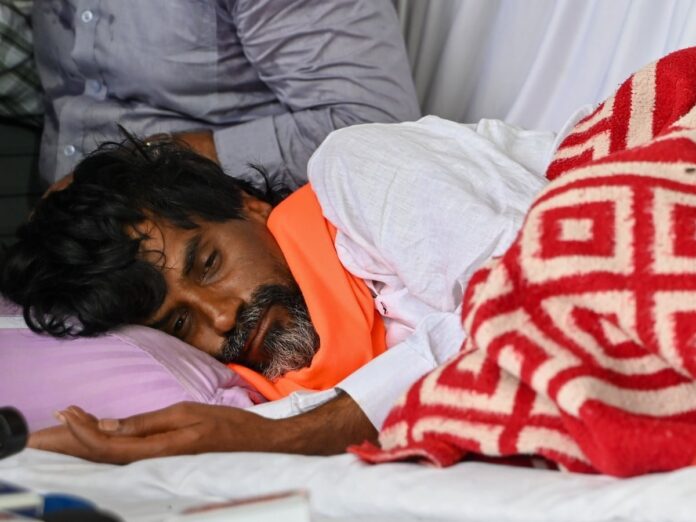The Maratha reservation agitation in Mumbai intensified on Tuesday as activist Manoj Jarange Patil refused to vacate Azad Maidan despite receiving a notice from authorities and a directive from the Bombay High Court. Jarange, who has been on an indefinite hunger strike for the past five days, declared that even death would not make him leave the protest site until the government accepts the community’s demand for quota rights.
Article Contents
High Court’s Directive to Protesters
The Bombay High Court, observing the disruption caused by the Maratha agitation, ordered Jarange’s supporters to clear all roads in Mumbai by Tuesday afternoon. The court stressed that the city had come to a standstill due to the demonstrations and pointed out that protestors had violated pre-decided conditions of their gathering.
The bench granted Jarange and his followers time until noon to restore normalcy, making it clear that public inconvenience and road blockades could not be tolerated. The court underlined that while the right to protest exists, it must be exercised without causing hardship to ordinary citizens.
Jarange’s Defiance
In a strong message, Jarange stood firm, refusing to vacate Azad Maidan. He said, “Even if my life ends, I will not leave this ground.” He appealed directly to Chief Minister Devendra Fadnavis, warning that the government would not be able to withstand the public outrage expected in the coming days.
He reiterated that the Maratha community’s demand for reservation must be accepted through a government resolution (GR) recognizing Marathas as Kunbi, an agrarian caste already listed under the Other Backward Classes (OBC) category. Such recognition would make Marathas eligible for reservation benefits in government jobs and educational institutions.
Warning to the Chief Minister
Jarange accused CM Fadnavis of misleading the High Court with incorrect information. He warned that the state government would have to pay the price if it continued to delay issuing a GR. He further demanded the immediate implementation of an earlier notification that extends OBC quota benefits to close relatives of eligible Marathas.
Reaffirming his resolve, Jarange said he would not leave Mumbai until the demands were met. He urged the government to provide accommodation to the 4,000–5,000 protesters currently camping at Azad Maidan if it truly cared for their welfare.
Police Notice to Vacate Azad Maidan
Earlier in the day, Mumbai Police served a notice to Jarange and his core team, directing them to vacate Azad Maidan. Officials noted that the agitation had violated the conditions under which permission for the protest was initially granted. Despite this, Jarange continued his indefinite fast, marking the fifth day of the protest.
The police stated that the notice was issued following the High Court’s observation that the agitation had paralyzed Mumbai. Authorities have expressed concern that prolonged road blockades and disruption of daily life could escalate tensions further in the city.
Jarange’s Call for Peace
Despite his defiance, Jarange appealed to his supporters to maintain peace during the agitation. He insisted that the movement would remain focused on securing quota benefits and would not resort to violence.
“I am ready for talks with the government,” he said, while warning that any attempt to forcibly remove protesters from Mumbai could prove dangerous. His comments reflected both his willingness to negotiate and his determination to resist until the demands are officially met.
The Demand for Reservation
At the heart of the agitation is the demand to include Marathas in the OBC category by recognizing them as Kunbi. This categorization would open doors to significant opportunities in government employment and higher education for the community.
For years, the Marathas have been pressing for a quota, citing social and economic backwardness. However, legal hurdles and constitutional caps on reservation percentages have complicated the issue. Jarange’s hunger strike is the latest chapter in a long-standing struggle that has seen repeated protests and clashes with authorities in Maharashtra.
Court’s Balancing Act
While issuing its directive, the High Court emphasized balancing the right to protest with public convenience. The judges noted that the city could not afford to remain crippled due to agitations, especially when they spill over into essential public spaces like roads.
The court’s directive for protesters to vacate the streets by Tuesday noon was seen as a final opportunity for Jarange’s group to comply voluntarily. Failure to do so, the court hinted, might invite stricter enforcement measures.
A Movement at Crossroads
As the agitation entered its fifth day, the standoff between the activist and the government reached a critical juncture. Jarange’s unwavering resolve, combined with growing numbers at Azad Maidan, signaled that the movement is unlikely to end quietly.
The outcome will depend on whether the state government issues a fresh GR granting the community’s demand or whether law enforcement steps in to enforce the High Court’s directive. Either way, the Maratha quota issue has once again pushed Mumbai into a state of tension and uncertainty.
Manoj Jarange Patil’s refusal to vacate Azad Maidan despite a High Court directive has set the stage for a dramatic confrontation between protesters and the Maharashtra government. His hunger strike, now in its fifth day, highlights the persistence of the Maratha community’s demand for reservation under the OBC category.
With the court ordering all roads cleared by Tuesday afternoon and Jarange declaring he will not leave even in death, the coming hours will be crucial in determining how the agitation unfolds. The balance between protest rights, public order, and political negotiations will decide the immediate future of the Maratha quota movement in Mumbai.




